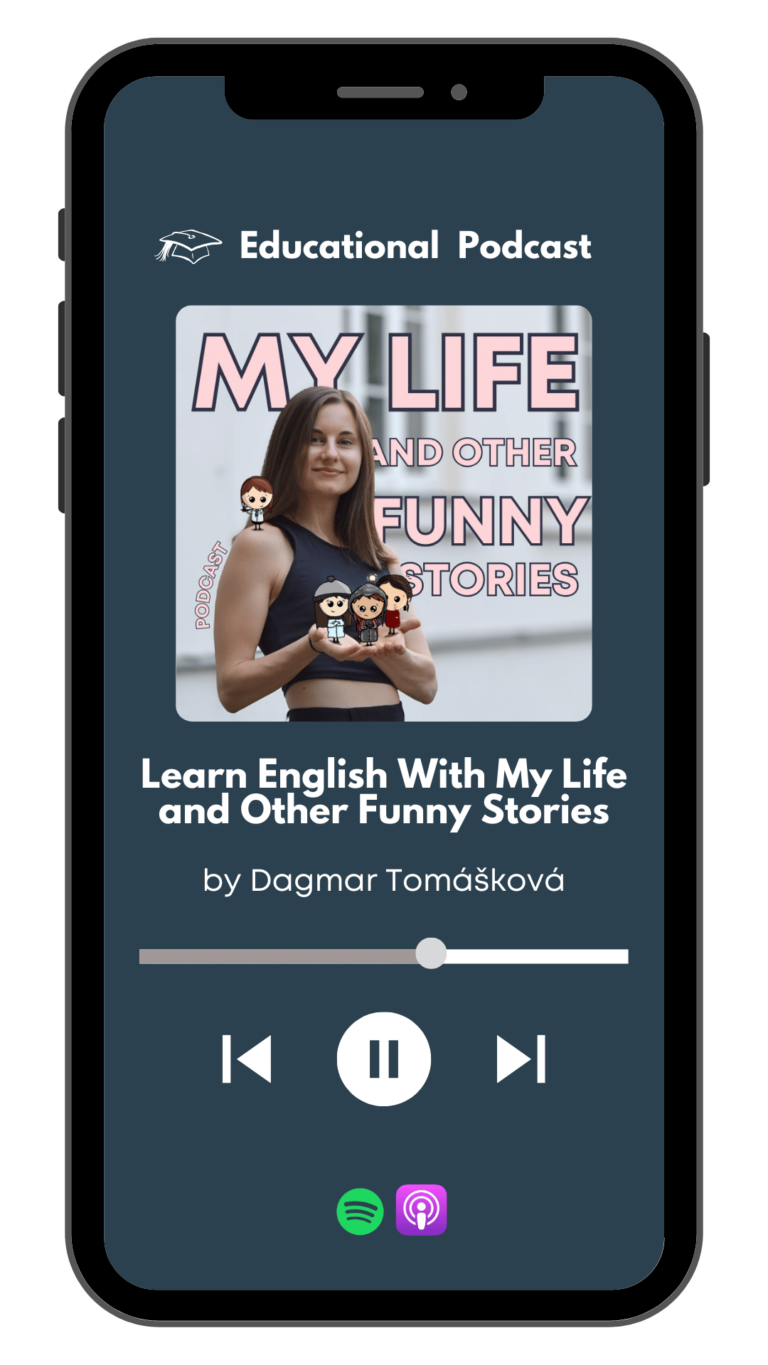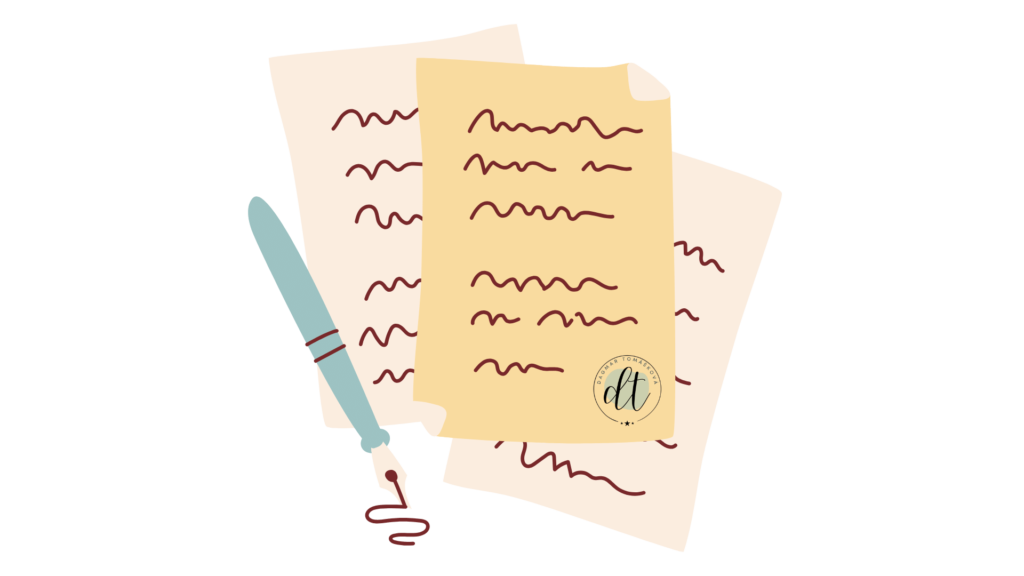
Ep.88: My Regrets (+ Past Modals Grammar!)
Today’s episode is going to be a mix of two things: grammar and regret. And if you’re thinking “ugh, grammar,”-don’t worry. I’m going to explain everything as simply as possible, like I’m explaining it to a five-year-old. And then, we’ll get into some real-life stories. Because yes, we all have regrets – I have many regrets and today I will share some of them with you. It is quite personal, so buckle up.

LISTEN TO THE EPISODE HERE:


WRITTEN TRANSCRIPTION OF THE PODCAST
Hello and welcome to my podcast My Life and Other Funny Stories. My name is Dagmar Tomášková, I am an English tutor and coach and I created this podcast for English students who want to improve their oral comprehension. As always, you can find the transcription of this episode and vocabulary list in the notes of the podcast.
Today’s episode is going to be a mix of two things: grammar and regret. And if you’re thinking “ugh, grammar,”-don’t worry. I’m going to explain everything as simply as possible, like I’m explaining it to a five-year-old. And then, we’ll get into some real-life stories. Because yes, we all have regrets – I have many regrets and today I will share some of them with you. It is quite personal, so buckle up.
First, let’s talk about grammar! Let me explain the past modals in under 3 minutes! Are you ready?
What Are Modal Verbs… and What Are Past Modals?
You already know modal verbs, right?
These little words that we use to express possibility, ability, advice, permission, and more. For example:
- can – I can speak English.
- should – You should study more.
- might – I might go to the cinema.
- would – I would love to travel more.
- must – You must wear a seatbelt.
I think that if you are listening to this podcast right now, you have definitely heard about these and know how to use them. Because these are used in the present or the future. But what if we want to talk about something that happened in the past? What if you want to say that you should have done something-but you didn’t?
Welcome to the magical world of past modals.
The basic structure is:
modal verb + have + past participle – don’t worry if you don’t understand perfectly, I will show it to you
- should have gone – I should have gone to bed earlier. In Czech: “Měl jsem jít do postele dříve” – but I didn’t.
- could have studied – I could have studied French harder. Mohla jsem se učit francouzky více. But I didn’t.
- would have eaten – I would have eaten more if I hadn’t been so nervous. “Býval bych toho snědl více, kdybych nebyl býval tak nervózní.
- might have called – I might have called you, but I didn’t have your number. “Možná bych ti býval zavolal, ale neměl jsem tvé číslo”.
I know that it sounds a little weird in Czech, but I have to say it like that so you fully understand where we use these structures.
We use them when we talk about:
- Regrets – I should have done this. I regret that I didn’t do it.
- Missed opportunities – I could have done something but I didn’t
- Imaginary or hypothetical past situations – I would have helped if I had known. That is by the way the third conditional.
- Uncertainty about the past – He might have forgotten. So you are not sure but you are speculating about the fact that he may have forgotten.
All of these help us talk about something we didn’t do, or didn’t happen, but we’re imagining it.
So when you think about the past and you say:
“I wish I had…”
“If only I had…”
“I regret that I didn’t…”
That’s your brain asking for past modals.
Now let’s get into the storytelling part of the podcast. Before I begin, I want to say this clearly: I don’t regret my life. I really don’t. I love where I am now, I love what I do, I love the people in my life. All the mistakes and weird situations brought me here.
But that doesn’t mean I wouldn’t have done some things differently. If I could have, I would have. And that’s what I want to talk about. Try to listen for these past modals in my stories so that you get the feel of how it is used in context. “Get the feel of doing something” means to learn how to do something.
1. I shouldn’t have obsessed over my weight.
This one… is hard to talk about. But I think it’s important.
When I was younger-around 19 or 20-I became really focused on my weight. Not in a healthy way. In a “I want to be good at something and I choose being skinny” kind of way.
I didn’t feel like I had a talent. I wasn’t sporty, I was smart but not like super smart, I didn’t play an instrument like a professional. I felt kind of… average. Which is totally fine by the way but back then, I really felt like I needed to be the best at something to have the right to exist. So I decided, unconsciously, that I would be “good at” being thin.
I counted every calorie. I skipped meals. I looked at food as a threat.
And the worst part? I regret it because now when I look back at it, my memories are tarnished with my constant worries about calories and to be honest, I don’t remember much from my birthday parties or being with friends because all I could think about were calories and how hungry I was. Now I feel like in my early 20s, there is a big black hole in place where my memories should be.. To tarnish something means to make it less valuable, less nice. So my memories are now damaged.
But another reason why I wouldn’t have done it, is because I severely damaged my body and it took me years to fix it and I feel like I am still dealing with the consequences in some ways. I definitely damaged my digestion a little bit and I lost my period for several years.
I might have avoided this if I’d had better guidance. But I also know I should have listened to my body. I should have reached out for help.
If you are a young girl, listen to me when I say this – nothing is worth your health and memories. Nothing. It is normal to be insecure; we all are at some stages of our life. But you don’t want to be older and looking back at your youth with nothing but emptiness in your memories. I am glad that I only experienced it for a little while but I should have realized it sooner. I wish I had.
I might make a whole episode about this, one day. But it’s still a bit personal. So… we’ll see.
2. I wish I had gone on Erasmus more than once.
I studied abroad only once – some of you who listen to my podcast frequently know that I went to France, and honestly, the beginning was tough. I cried, I felt homesick, I wanted to come home.
But then something changed. I found friends. I found freedom. I found this new, bold version of myself. Bold means confident and fearless.
I could have stayed longer. I should have gone to Erasmus sooner. Because I went to France in the nick of time. I was graduating the next semester. In the nick of time is a great idiom to express “ at the last possible moment”. So if you do something in the nick of time, it means that you couldn’t do it later because it was the last chance.
Looking back? I would have loved to do it again. If you’re at university now and thinking about Erasmus: go. Apply. Go again. Even if you’re scared. Especially if you’re scared.
Because real growth doesn’t happen when you’re comfortable. It happens when you’re crying in a foreign country and then laughing two weeks later with people who used to be strangers.
3. I should have studied French more seriously.
This one is a classic.
In high school, I had French classes. And… I did the bare minimum. I studied just enough to pass the test. I never thought I would need it. I never thought I’d want it.
And now, when I look at it, I could have learned so much back then. I could be at a different level today. I wish I had paid attention. I should have asked questions. I could have started building a stronger foundation. What saved me a little bit during high school though was that I had to do maturita exam and that made me learn a little. But my study was superficial. I wasn’t learning it to speak French in the future, I was learning it to pass an exam. If I could do it again, I would have started properly.
I didn’t really see the bigger picture, I didn’t see how much I would like to learn it in the future. On the other hand, I must say, our teachers were okay, but they were not great. For example, only now, when I have a course for pronunciation, am I learning about things I have never heard about and about the differences in pronunciation.
But hey-lesson learned. Never study something just for the test. Study it for life.
Anyway, what is the point of any of this? These regrets taught me a lot. And honestly, maybe I needed to make those mistakes to grow.
But if I can help you avoid even one of them? Then it’s worth it.
So let me ask you:
Is there anything you should have done?
Something you might have missed?
A lesson you could have learned sooner?
If you are listening to me in car, on in subway, or on your walk, try to answer these questions for yourself and try to use the modal verbs. Or!! – Let me know. Message me on Instagram. I love hearing from you.
Thank you for listening! If you liked this episode, please leave a five-star rating and share it with your friends. Don’t forget, you can find the transcript and vocabulary list in the notes of the podcast. See you next time. Bye bye

VOCABULARY LIST
regret – lítost
modal verbs – modální slovesa
past participle – příčestí minulé
speculating – spekulovat, domýšlet si
get the feel of something – zvyknout si na něco, naučit se něco dělat
obsessed – posedlý
unconsciously – nevědomky
threat – hrozba
tarnished – znehodnocené, pošpiněné
black hole – černá díra (metaforicky – prázdné místo v paměti)
severely – vážně, těžce
digestion – trávení
guidance – vedení, rada
insecure – nejistý, nemít jistotu sám v sobě
reached out for help – požádat o pomoc
bold – odvážný, smělý
in the nick of time – na poslední chvíli
looking back – při zpětném pohledu
bare minimum – naprosté minimum
foundation – základy (např. jazyka)
superficial – povrchní
the bigger picture – širší souvislosti
lesson learned – ponaučení (doslova: lekce naučena)
avoid – vyhnout se